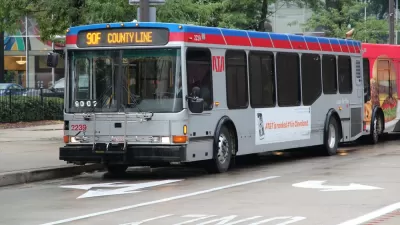With nearly $5 million dedicated to regional planning initiatives, Angie Schmitt questions whether public officials in greater Cleveland are willing to make the hard decisions and compromises necessary to make the area competitive once again.
Winning nearly $5 million from federal and local funding sources to create a plan for regional sustainability was the easiest part of establishing a coordinated plan to address the rapid abandonment of Cleveland's urban areas for unplanned, exurban development, observes Schmitt.
"Of course, winning a grant and mustering the political will to do some actual transformative planning are two different things. Right now there is a fierce internal struggle going on within Northeast Ohio's Sustainable Communities Consortium (NEOSCC), and the outcome could determine whether the region puts the $5 million grant to good use or wastes a rare opportunity."
More than a year after NEOSCC began the planning process, little progress has been made and an internal reorganization has exposed conflicts over the desired magnitude and focus of the plan, writes Schmitt.
"NEOSCC is made up of a broad cross-section of regional interests - rural, suburban and urban officials; representatives from communities of color; highway proponents; bike advocates; environmentalists; business leaders. Younger, more progressive factions want to discuss planning tools that seem daring in Cleveland, like urban growth boundaries, while others - namely those with a long history of government service in Northeast Ohio - say it's not even worth discussing."
"Regions around the country are adopting a new 'technology' - land use planning - to make their cities cleaner, more efficient, healthier and more equitable. Will greater Cleveland reject this new technology – like the Aborigines of Northeast Australia rejected bows and arrows - and further resign itself to becoming a once-great but fallen empire?"
FULL STORY: Will Greater Cleveland Squander Its Chance to Be Competitive Again?

Planetizen Federal Action Tracker
A weekly monitor of how Trump’s orders and actions are impacting planners and planning in America.

Restaurant Patios Were a Pandemic Win — Why Were They so Hard to Keep?
Social distancing requirements and changes in travel patterns prompted cities to pilot new uses for street and sidewalk space. Then it got complicated.

Map: Where Senate Republicans Want to Sell Your Public Lands
For public land advocates, the Senate Republicans’ proposal to sell millions of acres of public land in the West is “the biggest fight of their careers.”

Maui's Vacation Rental Debate Turns Ugly
Verbal attacks, misinformation campaigns and fistfights plague a high-stakes debate to convert thousands of vacation rentals into long-term housing.

San Francisco Suspends Traffic Calming Amidst Record Deaths
Citing “a challenging fiscal landscape,” the city will cease the program on the heels of 42 traffic deaths, including 24 pedestrians.

California Homeless Arrests, Citations Spike After Ruling
An investigation reveals that anti-homeless actions increased up to 500% after Grants Pass v. Johnson — even in cities claiming no policy change.
Urban Design for Planners 1: Software Tools
This six-course series explores essential urban design concepts using open source software and equips planners with the tools they need to participate fully in the urban design process.
Planning for Universal Design
Learn the tools for implementing Universal Design in planning regulations.
Heyer Gruel & Associates PA
JM Goldson LLC
Custer County Colorado
City of Camden Redevelopment Agency
City of Astoria
Transportation Research & Education Center (TREC) at Portland State University
Camden Redevelopment Agency
City of Claremont
Municipality of Princeton (NJ)




























